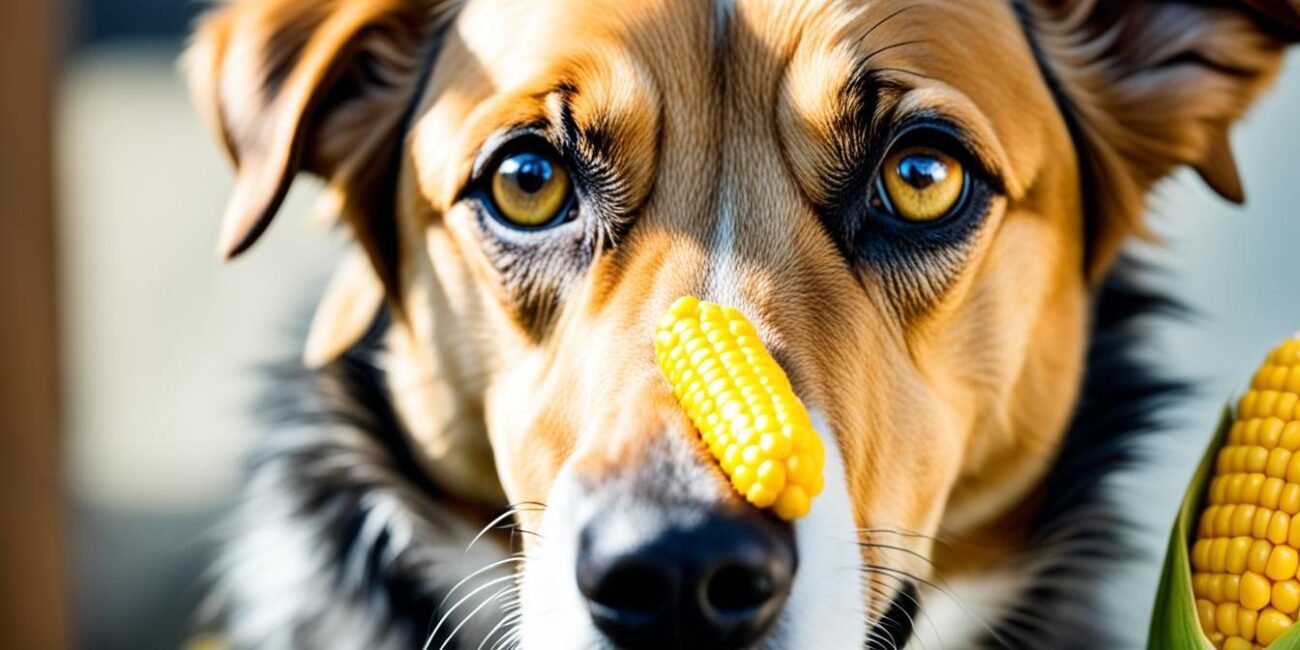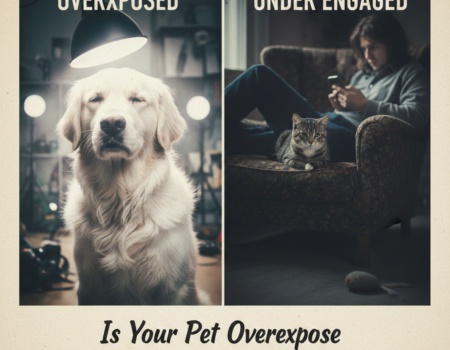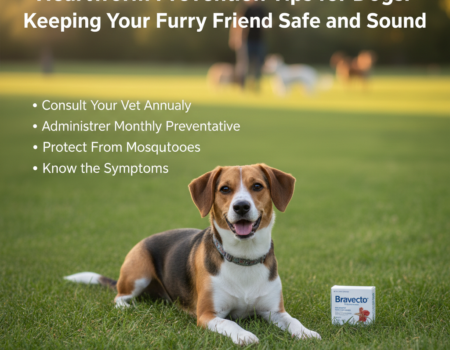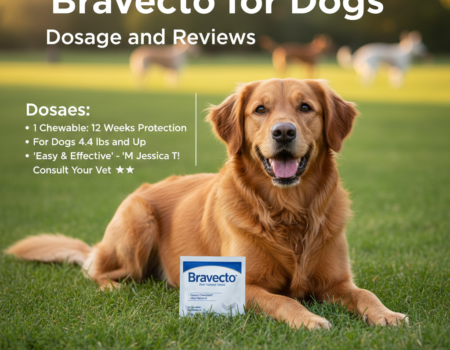Did you know that corn is one of the most common ingredients found in commercial dog food and treats? In fact, it is estimated that over 60% of dog food products on the market contain corn in some form. This surprising statistic highlights the prevalence of corn in dogs’ diets and raises questions about its suitability for our furry friends.
Corn has long been a controversial topic when it comes to canine nutrition. Some dog owners consider it a healthy and nutritious addition to their pet’s diet, while others raise concerns about its potential negative effects. To unravel the truth about dogs and corn consumption, let’s delve into the nutrition facts and explore the pros and cons of including corn in a dog’s diet.
Key Takeaways:
- Corn is a common ingredient in many commercial dog food and treat products.
- While dogs can digest corn, it should not be the primary ingredient in their diet.
- Some dogs may have allergies or intolerances to corn, so it’s important to monitor their reactions.
- Corn provides carbohydrates, linoleic acid, proteins, and antioxidants, but it should be supplemented with high-quality animal protein.
- Dogs can safely consume corn kernels, but the cob should be avoided due to choking and blockage risks.
Grains in a Dog’s Diet
When it comes to a dog’s diet, a balanced and nutritious meal is essential for their overall health and well-being. While dogs are primarily carnivorous, they can benefit from incorporating plant material into their diet as well. Grains, such as corn, are often used in dog food and treats due to their availability and cost-effectiveness.
However, it’s important to note that grains like corn should not replace high-quality animal protein in a dog’s diet. While corn does provide some nutritional value, it should be seen as a supplementary ingredient rather than the main source of nutrition.
Corn can be included in a dog’s diet as an occasional treat, adding variety and flavor to their meals. It can also serve as a source of carbohydrates and fiber. However, it’s crucial to ensure that dogs receive an adequate amount of animal protein for their muscle development and overall health.
Choosing the Right Balance
When selecting dog food or treats that contain corn, it’s important to carefully read the labels and choose products that prioritize high-quality animal protein as the main ingredient. Look for labels that identify a specific meat source, such as chicken, beef, or fish, to ensure that your dog is getting essential amino acids and nutrients.
Balanced nutrition is essential for dogs, and corn can be a part of their diet as long as it’s used in moderation and doesn’t replace vital sources of animal protein.
Some dog owners may choose to feed their pets a grain-free diet to address potential allergies or sensitivities to grains like corn. While grain-free diets are available and can be appropriate in certain cases, it’s crucial to consult with a veterinarian before making any significant changes to your dog’s diet.
Ultimately, providing a balanced and varied diet that includes high-quality animal protein, appropriate grains like corn as treats, and other nutrient-rich ingredients will help ensure your dog’s nutritional needs are met.
Can Dogs Digest Corn?
Dogs have the ability to digest corn, but it’s important that the corn is properly processed. The digestion rate for corn in dogs is approximately 90%. This means that most of the nutrients present in corn can be absorbed and utilized by a dog’s body.
Cooking or grinding corn into a meal improves its digestibility for dogs. When corn is cooked or ground, it breaks down the tough outer layer, making it easier for dogs to digest. This process also helps to release valuable nutrients, allowing dogs to derive the maximum benefit from corn’s nutritional content.
It’s worth noting that while dogs have the ability to digest corn, it should not be the sole or primary component of their diet. Dogs are omnivores, which means they require a balanced diet that includes a variety of protein sources, carbohydrates, fats, vitamins, and minerals.
“Dogs can digest corn, but it needs to be properly processed.”
The Digestion Process
When dogs consume corn, it goes through the digestion process in the same way as other food. The corn is broken down in their stomachs and small intestines, where the nutrients are absorbed into the bloodstream and transported to different parts of the body for energy and growth.
However, it’s important to remember that not all dogs have the same digestive capabilities. Some dogs may have a more sensitive digestive system, while others may have allergies or intolerances to certain ingredients, including corn.
The Benefits of Properly Processed Corn
Corn has several nutritional benefits for dogs when it is properly processed and included as part of a balanced diet. It is a good source of carbohydrates, which provide energy for daily activities. Corn also contains linoleic acid, an essential fatty acid that promotes healthy skin and coat in dogs.
The antioxidants present in corn help to boost the immune system and protect against oxidative stress. Additionally, corn contains proteins that contribute to muscle development and repair.
| Benefits of Corn for Dogs | Processing Method |
|---|---|
| Source of carbohydrates for energy | Cooking or grinding corn |
| Promotes healthy skin and coat | Cooking or grinding corn |
| Provides antioxidants | Cooking or grinding corn |
| Contributes to muscle development and repair | Cooking or grinding corn |
By properly processing corn, dogs are able to digest it more efficiently and gain the nutritional benefits it offers.
Is Corn Good for Dogs?
Corn can be a beneficial addition to a dog’s diet, providing a range of nutritional benefits. This versatile grain is rich in carbohydrates, linoleic acid, proteins, and antioxidants, making it a valuable source of energy for dogs. Corn’s nutrient profile promotes overall health and vitality in our furry friends.
However, it’s important to note that corn should not be the primary source of nutrition for dogs. While it offers valuable nutrients, dogs require a balanced diet that includes high-quality animal protein to meet their nutritional needs. Corn should be supplemented with protein-rich foods to ensure optimal nutrition for your furry companion.
Here are some key benefits of including corn in your dog’s diet:
- Carbohydrates: Corn provides dogs with easily digestible carbohydrates, which serve as a source of energy.
- Linoleic Acid: Corn is a natural source of linoleic acid, an essential fatty acid that promotes healthy skin and a shiny coat.
- Proteins: While corn is not as high in protein as meat, it still contributes to the overall protein content in a dog’s diet.
- Antioxidants: Corn contains antioxidants that help support a dog’s immune system and protect against free radicals.
Supplementing Corn with High-Quality Animal Protein
Although corn provides valuable nutrients, it should always be supplemented with high-quality animal protein to ensure your dog receives a well-rounded diet. Protein is essential for muscle development, cell repair, and overall growth.
Our goal is to provide dogs with a balanced diet that incorporates a variety of nutrients, including both plant-based and animal-based ingredients. By combining corn with high-quality animal protein sources, we can ensure that our dogs receive the essential nutrients they need for optimal health and well-being.
It’s worth noting that some dogs may have allergies or intolerance to corn. If you notice any signs of sensitivity, such as itching, redness, or digestive upset after feeding corn-based products, consult with your veterinarian. They can provide guidance on whether to eliminate corn from your dog’s diet and suggest suitable alternatives.
To summarize, corn can be a beneficial addition to a dog’s diet, offering valuable nutrients and promoting overall health. However, it should not be the primary source of nutrition and should always be supplemented with high-quality animal protein. As responsible pet owners, we should strive to provide our dogs with a well-rounded, balanced diet that meets their individual needs.
Can Dogs Have Corn Allergies?
While corn is generally safe for most dogs, some can develop allergies to it. Just like humans, dogs can experience allergic reactions to certain substances, and corn is no exception. It’s important for dog owners to be aware of the signs of a corn allergy in their furry companions.
Signs of Corn Allergy in Dogs:
- Intense itching and scratching
- Red, inflamed skin
- Ear infections
- Chronic diarrhea or gastrointestinal upset
If you notice any of these signs after your dog consumes corn-based food, it is recommended to consult a veterinarian. They can perform tests to determine if your dog is indeed allergic to corn and help you develop a suitable diet plan.
If your dog is diagnosed with a corn allergy, there are grain-free and corn-free dog food options available in the market. These specialized products are formulated to meet the nutritional needs of dogs with specific dietary restrictions. They can provide a safe alternative for dogs with corn allergies, ensuring they still receive a balanced and nutritious diet.
Corn in Dog Treats and Dog Food
Corn is a commonly used ingredient in many dog treats and dog food products. However, it’s important to note that corn should not be the primary component. High-quality dog food should have a good source of animal protein listed as the first ingredient, followed by a blend of fruits, vegetables, and grains like corn.
Corn is often used as a filler in commercial dog treats and dog food products because it is readily available and cost-effective. It helps to bind the ingredients together and give the treats a desirable texture. However, too much corn can lead to an imbalance in a dog’s diet and may not provide the necessary nutritional benefits.
In the making of high-quality dog food, corn serves as a supplementary ingredient rather than the main component. It contributes to the overall nutrient profile of the product, providing carbohydrates, fiber, and essential vitamins and minerals. The combination of corn with other ingredients ensures a well-rounded and balanced diet for dogs.
Here is an example of a balanced dog food ingredient list:
| Ingredient | Percentage |
|---|---|
| Chicken | 30% |
| Peas | 15% |
| Carrots | 10% |
| Corn | 10% |
| Other Fruits and Vegetables | 15% |
| Whole Grains (such as barley and brown rice) | 20% |
In this example, corn makes up 10% of the total dog food composition. It complements the other ingredients, providing a source of energy and fiber. The inclusion of various fruits, vegetables, and whole grains ensures a diverse nutrient profile that meets a dog’s nutritional needs.
Remember, when choosing dog treats and dog food, it’s essential to read the ingredient labels carefully. Look for brands that prioritize high-quality animal proteins as the main ingredient and use corn as one of the supporting components. This way, you can ensure that your furry friend receives a balanced and nutritionally complete diet.
Corn-Based Dog Food Products: A Closer Look
When it comes to dog food, corn is a commonly used ingredient. One of the reasons for its popularity is its lower cost compared to meat. However, it’s important to understand the role of corn in dog food and its impact on your furry friend’s diet.
Corn is often used as a filler in dog food due to its high availability and affordability. Cheaper dog food products may have a higher corn-to-meat ratio, which is not ideal for your dog’s nutritional needs. While corn can provide some nutritional benefits, it should not be the main component of your dog’s diet.
Quality dog food should prioritize meat-based proteins as the primary ingredient. Meat is a more natural and digestible source of protein for dogs. Additionally, a balanced blend of fruits, vegetables, and grains, including corn, can contribute to a well-rounded diet. However, corn should not be the primary filler or substitute for high-quality animal protein.
The Importance of Meat-Based Proteins
Meat-based proteins are essential for your dog’s overall health and well-being. They provide the necessary amino acids and nutrients that dogs need to thrive. High-quality dog food should have a good source of animal protein listed as the first ingredient.
While corn does contain some protein, it lacks certain essential amino acids that are abundant in meat. Dogs require these amino acids for proper muscle development, immune function, and overall growth. Therefore, relying solely on corn as a protein source may lead to nutritional deficiencies in your dog’s diet.
A Balanced Blend of Ingredients
A balanced diet for your dog should include a variety of ingredients, including fruits, vegetables, and grains. These components can provide vital vitamins, minerals, and fiber to support your dog’s overall health. Corn can be a part of this balanced blend, but it should not be the main component or filler in your dog’s food.
When choosing a dog food product, look for brands that prioritize high-quality animal protein and incorporate a balanced mix of ingredients. This ensures that your dog receives the necessary nutrients and avoids relying too heavily on corn as a filler.
Table: Comparison of Corn-Based and Quality Dog Food Products
| Criteria | Corn-Based Dog Food | Quality Dog Food |
|---|---|---|
| Primary Ingredient | Corn | High-quality animal protein |
| Nutritional Value | Lower protein content, lacks essential amino acids | Higher protein content, includes essential amino acids |
| Cost | Lower cost due to higher corn content | Higher cost due to quality ingredients |
| Inclusion of Fruits, Vegetables, and Grains | May have lower inclusion of other ingredients | Includes a balanced blend of various ingredients |
While corn-based dog food products may be cheaper, it’s important to consider the long-term health implications for your furry friend. Investing in quality dog food that prioritizes meat-based proteins and includes a balanced blend of ingredients is crucial for their overall well-being.
Corn Allergies in Dogs: What to Do?
Dogs with corn allergies can suffer from various symptoms, including itching, skin irritation, digestive issues, and respiratory problems. If your furry friend is allergic to corn, it’s crucial to make dietary adjustments to prevent allergic reactions.
To alleviate corn allergies in dogs, a grain-free diet is typically recommended. Grain-free dog food avoids ingredients like corn, wheat, and soy that may trigger allergic responses. Instead, these dog foods incorporate alternative carbohydrates that are more easily digestible for dogs with food sensitivities.
Fortunately, there are numerous grain-free and corn-free dog food options available in the market. These specialized formulas prioritize high-quality animal protein sources and include alternative carbohydrates such as sweet potatoes, peas, and lentils. They provide all the necessary nutrients while avoiding potential allergens like corn.
In addition to grain-free options, there are also hypoallergenic dog foods specially formulated for dogs with allergies. These diets feature limited ingredient lists and utilize novel protein sources like duck, venison, or fish to minimize the risk of triggering allergic reactions.
When transitioning to a new diet, it’s essential to do it gradually over several days to avoid gastrointestinal disturbances. Slowly mix increasing amounts of the new grain-free or hypoallergenic dog food with your dog’s current food, gradually reducing the old food until the switch is complete.
Remember, if you suspect your dog has a corn allergy or any other food allergy, consult with your veterinarian for an accurate diagnosis and appropriate dietary recommendations. They can help you determine the best course of action for managing your dog’s allergies and ensuring their overall well-being.
Dog Nutrition: The Bigger Picture
Corn is just one aspect of a dog’s overall nutrition. A balanced diet for dogs includes proteins, carbohydrates, fats, vitamins, and minerals. Each of these components plays a vital role in maintaining the health and vitality of dogs.
A well-rounded diet for dogs should consist of:
- Proteins: High-quality animal protein sources like chicken, beef, fish, or lamb provide essential amino acids for muscle development and repair.
- Carbohydrates: Whole grains like brown rice and oats, as well as fruits and vegetables, provide energy and necessary dietary fiber.
- Fats: Healthy fats from sources like fish oil, flaxseed, or chicken fat support shiny coats, brain health, and provide a concentrated source of energy.
- Vitamins and Minerals: Fruits and vegetables offer a wide range of essential vitamins and minerals that contribute to overall health and support the immune system.
A balanced diet ensures that dogs receive the necessary nutrients for optimal health, growth, and longevity. While corn can be part of a dog’s diet, it should not replace the variety of nutrients derived from a well-rounded diet.
Benefits of a balanced diet for dogs
A balanced diet for dogs offers numerous benefits:
- Healthy weight management: Proper nutrition promotes a healthy weight, which reduces the risk of obesity-related health problems.
- Strong immune system: Essential nutrients support the immune system, protecting dogs from illnesses and diseases.
- Improved digestion: A well-balanced diet with dietary fiber aids digestion and promotes healthy bowel movements.
- Enhanced skin and coat health: Nutrients like omega-3 fatty acids contribute to a shiny and healthy coat.
- Better dental health: Crunchy foods and dental treats can help remove plaque and tartar, maintaining good oral hygiene.
A balanced diet ensures that dogs receive the necessary nutrients for optimal health, growth, and longevity.
By focusing on providing a balanced diet, pet owners can ensure that their dogs are receiving all the essential nutrients they need for a healthy and fulfilling life.
| Nutrient | Sources | Functions |
|---|---|---|
| Proteins | Chicken, beef, fish, lamb | Aid in muscle development and repair |
| Carbohydrates | Brown rice, oats, fruits, vegetables | Provide energy and dietary fiber |
| Fats | Fish oil, flaxseed, chicken fat | Support coat health, brain function, and energy |
| Vitamins and Minerals | Fruits, vegetables | Contribute to overall health and immune system support |
Corn on the Cob: A Word of Caution
While corn kernels can be a safe and enjoyable part of a dog’s diet, it’s important to exercise caution when it comes to the cob itself. Dogs may find the cob to be an enticing chew toy, but ingesting it can pose serious risks to their health.
The main danger lies in the cob’s shape and texture, which can cause choking or blockages in a dog’s digestive system. The cylindrical shape and hard surface of the cob make it difficult for dogs to chew and swallow safely.
Choking hazards aside, the cob’s fibrous nature can also lead to intestinal blockages. When a dog ingests the cob, it can potentially become lodged in their intestines, obstructing the passage of food and causing severe discomfort or even requiring surgical intervention.
The Risks of Corn Cob Ingestion
When a dog ingests a corn cob, they may experience the following symptoms:
- Significant distress
- Difficulty breathing or coughing
- Pawing at the mouth or throat
- Vomiting or retching
- Lethargy or weakness
- Loss of appetite
It’s crucial to act immediately if you suspect that your dog has ingested a corn cob. Contact your veterinarian or an emergency animal hospital for guidance. They will be able to instruct you on the next steps and provide the necessary medical attention to ensure your dog’s well-being.
Safe Alternatives to Corn on the Cob
If you’d like to offer your dog a corn-based treat, it’s essential to choose safe alternatives that eliminate the risk of cob ingestion. Consider the following options:
- Fresh, cooked corn kernels removed from the cob
- Corn-based dog treats specifically designed for safe consumption
- Commercial dog foods that use corn as an ingredient (processed and free from cob)
Avoiding Potential Hazards
Preventing your dog from accessing corn cobs is crucial for their safety and well-being. Dispose of corn cobs properly and securely, keeping them out of your dog’s reach. Be mindful when attending outdoor gatherings or picnics where corn-on-the-cob may be served, as dogs may be tempted to find and chew discarded cobs.
By being proactive and attentive to the potential risks associated with corn cob ingestion, you can help ensure your dog’s safety and maintain their overall health and happiness.
Conclusion
In conclusion, dogs can safely enjoy corn as part of a balanced diet. While corn provides some nutritional benefits, it should not be the main component of a dog’s nutrition. High-quality animal protein should remain the primary source to ensure dogs receive the necessary nutrients for their overall health and well-being.
It is important to note that some dogs may develop allergies or intolerance to corn. If you notice any signs of discomfort or adverse reactions after feeding your dog corn-based products, it’s best to consult a veterinarian for guidance.
Remember, maintaining a well-rounded and balanced diet is essential for your furry friend. Corn can be a tasty addition to their meals, but it should always be properly processed and portioned. By offering a diverse range of nutritious foods, you can provide your dog with the optimal nutrition they need to thrive.
FAQ
Can dogs eat corn?
Dogs can eat corn, but it should not be the primary ingredient in their diet.
Is corn a suitable part of a dog’s diet?
Yes, corn can be included in a dog’s diet as a treat, but it should not replace high-quality animal protein.
Can dogs digest corn?
Yes, dogs can digest corn, but it needs to be properly processed and cooked or ground into a meal for improved digestibility.
What are the benefits of corn for dogs?
Corn is rich in carbohydrates, linoleic acid, proteins, and antioxidants, providing energy and promoting overall health in dogs.
Can dogs have allergies to corn?
Yes, some dogs can develop allergies to corn. Signs of a corn allergy may include itching, red skin, or gastrointestinal upset.
Is corn commonly found in dog treats and dog food?
Yes, corn is commonly used as a filler in dog treats and dog food, but it should not be the main ingredient.
Why is corn used in dog food products?
Corn is often used in dog food due to its lower cost compared to meat, but quality dog food should prioritize meat-based proteins.
What are the alternatives for dogs with corn allergies?
Grain-free and corn-free dog food options are available for dogs with corn allergies. Hypoallergenic dog foods may also be suitable.
What should a dog’s nutrition focus on?
A balanced diet for dogs should include proteins, carbohydrates, fats, vitamins, and minerals, with high-quality animal protein as the main source of nutrition.
Can dogs eat corn on the cob?
No, dogs should not eat corn on the cob as it poses a significant risk of choking or causing blockages in the digestive system.
Should corn be a significant part of a dog’s diet?
No, corn should not replace the variety of nutrients derived from a well-rounded diet in dogs.










No Comment! Be the first one.